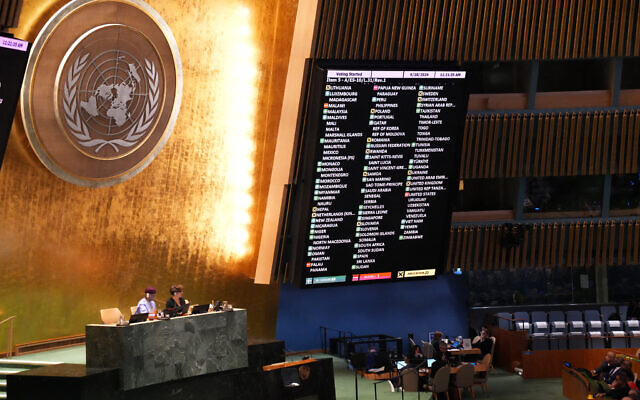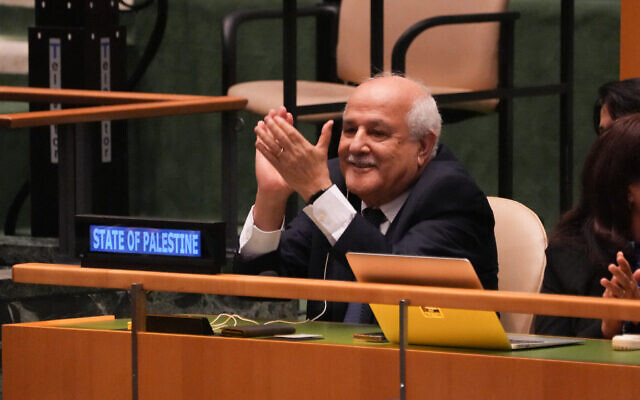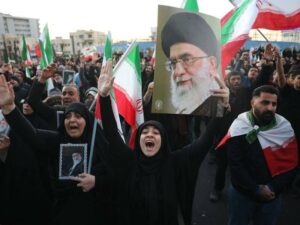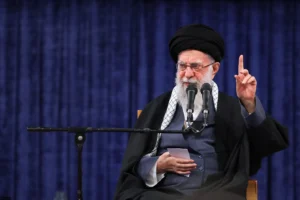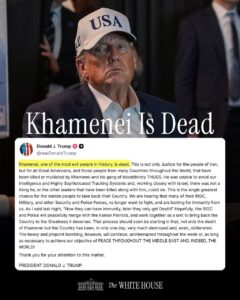On September 18, 2024, the United Nations General Assembly adopted a significant resolution demanding that Israel withdraw from the Palestinian territories it occupies within 12 months. This resolution, supported by 124 countries, sets a firm timeline for Israel’s full military and civilian withdrawal from the areas that the UN defines as “Occupied Palestinian Territory.”
This decision aligns with an earlier advisory opinion from the International Court of Justice (ICJ), also known as the World Court. The ICJ, in a ruling delivered in July 2024, declared that Israel’s occupation of Palestinian territories, including its settlements, is illegal under international law. The court advised that Israel must end its occupation “as rapidly as possible.” The UN’s resolution builds on this by setting a specific deadline for the withdrawal.
The UN resolution is comprehensive and includes several key demands:Israel is required to withdraw from all Palestinian areas it occupies, including the West Bank, East Jerusalem, and the Gaza Strip, within the next 12 months. The resolution stresses that Israel’s presence in these areas is illegal and must end “without delay.”
The resolution calls for an international embargo on the transfer of arms, munitions, and military equipment to Israel. The embargo targets any arms that could be used in the occupied Palestinian territories, with the UN urging states to ensure that such equipment is not provided to Israel.
Countries are urged to stop importing goods produced in Israeli settlements, which are located in territories the UN considers occupied. The resolution seeks to cut off economic support for these settlements, which are viewed as illegal under international law.
The resolution was sponsored by the “State of Palestine” and supported by 29 other countries, many of which are predominantly Muslim. In total, 124 countries voted in favor of the resolution, while 14 countries voted against it, and 43 abstained.
Among the notable countries that voted against the resolution were Israel, the United States, Czechia, and Argentina. Several Pacific island nations, along with Paraguay and Malawi, also opposed the measure. The resolution saw significant abstentions from European nations like the UK, Germany, Italy, and Ukraine, as well as other countries such as Canada and Australia. These abstaining countries may have been trying to strike a balance between supporting international law and maintaining diplomatic relations with Israel.
Israel’s reaction to the UN’s decision was swift and strong. The Israeli government, particularly the Foreign Ministry, condemned the resolution, calling it “cynical international politics.” Israel argues that the resolution ignores critical security issues and recent violent attacks on its civilians.
Israel pointed specifically to the events of October 7, 2024, when the militant Palestinian group Hamas launched a brutal cross-border attack that left over 1,200 Israelis dead, most of whom were civilians. Hamas militants also kidnapped 251 people, including women and children, and took them as hostages to Gaza. Israel claims that by ignoring this context, the UN is effectively rewarding terrorism.
In a statement posted on social media, Israel’s Foreign Ministry argued that the resolution strengthens terrorist organizations like Hamas and their backers, such as Iran. It claimed the resolution would make a peaceful resolution to the conflict even more difficult and sends a dangerous message to terrorist groups that their violent tactics are successful.
The ministry also expressed concern that the resolution could complicate ongoing efforts to secure the release of hostages. Israel has been working through international mediators to negotiate a potential ceasefire and the release of captives in exchange for halting the violence. Israel believes that the resolution, by siding with Palestine, makes it less likely that Hamas would agree to such a deal.
This UN resolution, while not legally binding, places significant diplomatic pressure on Israel. If Israel does not comply with the 12-month withdrawal deadline, it could face increasing international isolation, sanctions, and further restrictions on arms imports. The embargo on settlement goods could also hurt Israel economically by limiting trade with countries that take steps to enforce the embargo.
However, the resolution also underscores the deep divides within the international community regarding the Israel-Palestine conflict. The abstentions by several major European powers and other allies of Israel highlight the complex geopolitical calculations at play. These countries may not fully support Israel’s continued occupation of Palestinian lands, but they are wary of taking a position that could jeopardize their strategic alliances with Israel or destabilize the region further.
What’s Next for Israel and Palestine?
The resolution puts the ball in Israel’s court, but it is highly unlikely that Israel will comply with the UN’s demands. The Israeli government has made it clear that it views this resolution as one-sided and disconnected from the realities on the ground, particularly in light of the recent Hamas attacks.
It is possible that Israel will take retaliatory actions against the Palestinian Authority, which played a central role in pushing for the resolution. These actions could include diplomatic or economic sanctions, further military operations, or restricting movement in the West Bank and Gaza.
On the other hand, Palestine and its supporters will likely push for further international actions, possibly including more sanctions or legal challenges against Israel in international courts. For Palestinians, this resolution represents a significant diplomatic victory, even if it is unlikely to result in immediate changes on the ground.
In the coming months, the focus will likely shift to whether countries that supported the resolution will take concrete steps to enforce the embargoes on arms and settlement goods, and how Israel will respond diplomatically and militarily.
The UN’s resolution demanding Israel’s withdrawal from Palestinian territories within a year marks a significant moment in the ongoing Israel-Palestine conflict. While it is unlikely to lead to immediate changes, it reflects growing international frustration with the lack of progress towards peace. With Israel vowing to respond and the conflict still simmering, the situation remains volatile and unpredictable.

